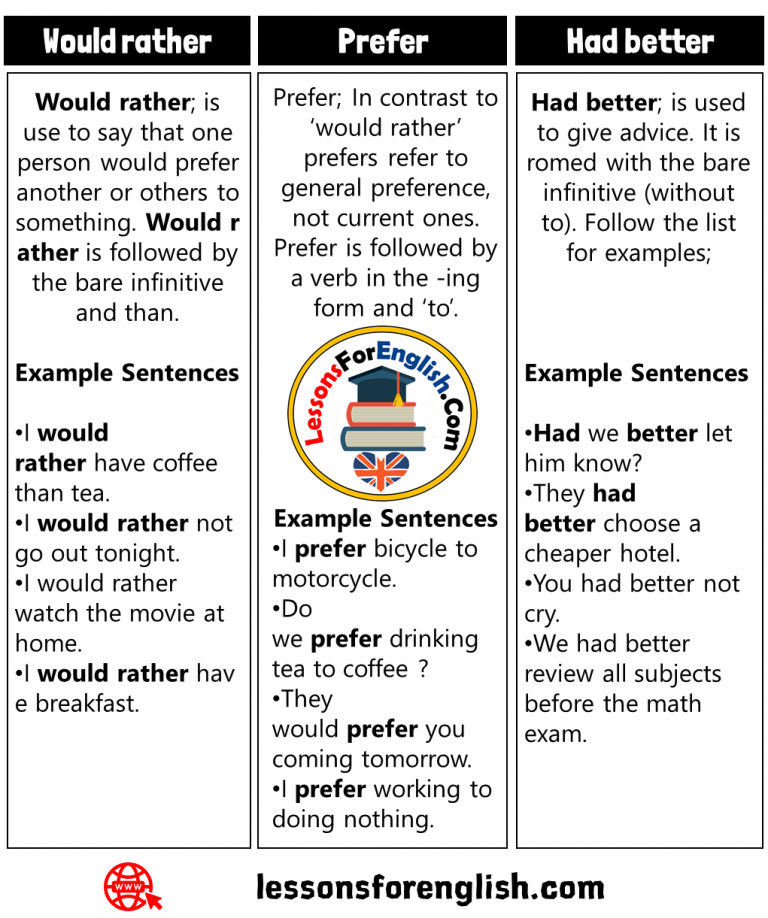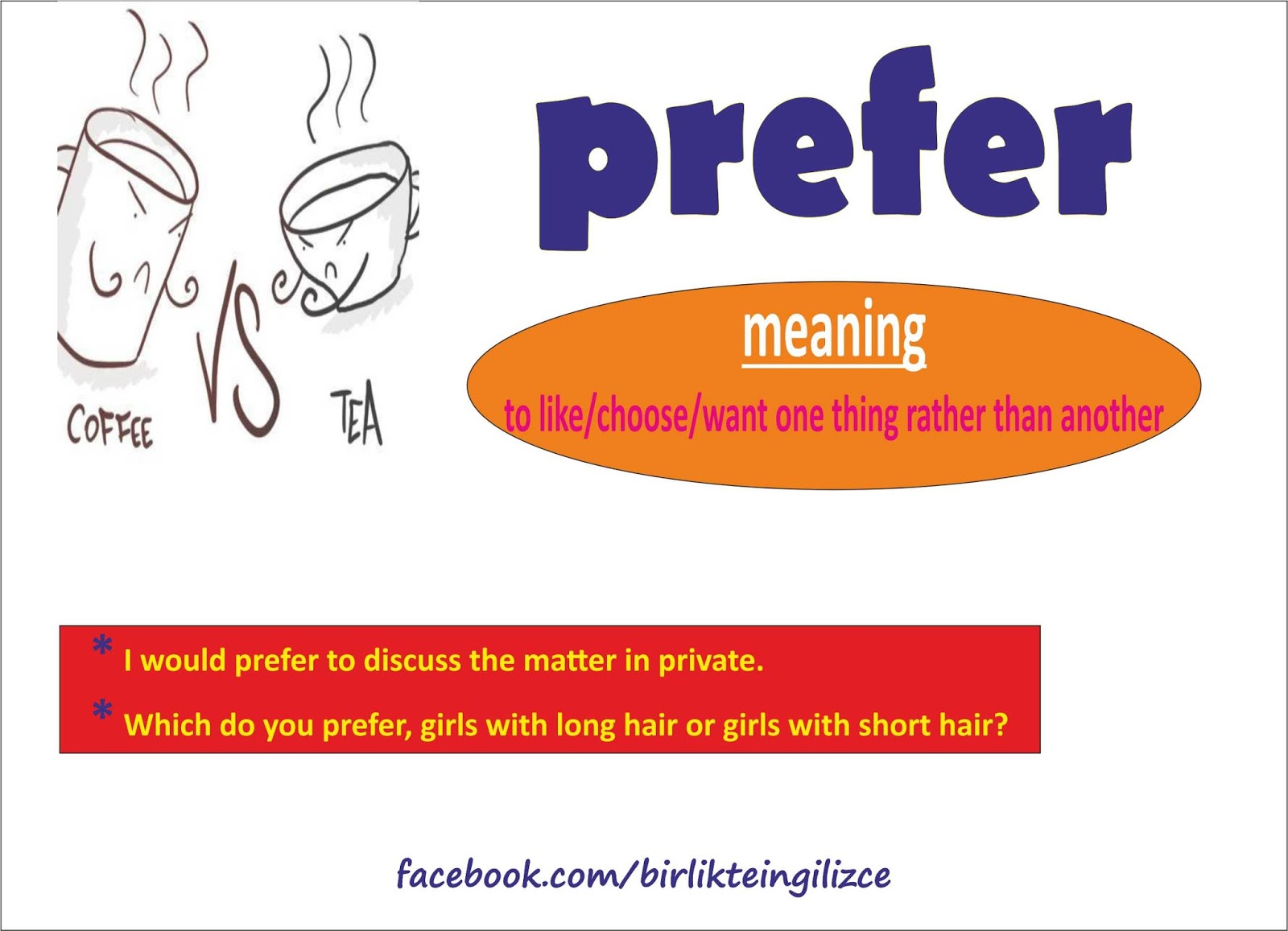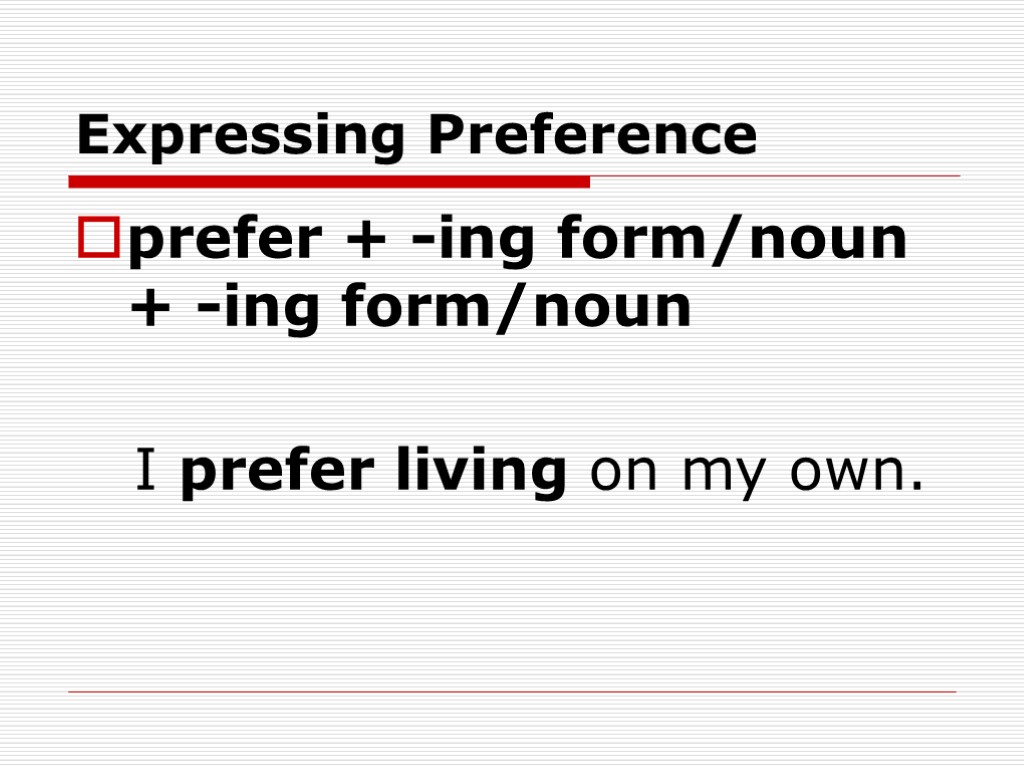
LOVE, LIKE, ENJOY, HATE, PREFER + VE… English ESL worksheets pdf & doc
"Prefer to" vs "prefer than" Ask Question Asked 10 years, 4 months ago Modified 5 years, 6 months ago Viewed 314k times 19 I am confused as to when to use "prefer to" and "prefer than". For example, we write: I prefer coffee to tea. So why can't we use than instead of to? Also, can someone give me an example of a sentence where we use prefer than?

TOMi.digital LOVE, LIKE, DISLIKE, HATE!
We can use a prepositional phrase with to when we compare two things or actions: I prefer tea to coffee. We prefer going by ferry to flying. We don't use than after prefer: She prefers books to magazines. Not: She prefers books than magazines. We can use a to -infinitive or an -ing form after prefer. A to -infinitive is more common.

Like vs Prefer. Prefer to. Prefer + ing. Prefer + rather than. in hindi. YouTube
Verb patterns: verb + infinitive or verb + - ing ? - English Grammar Today - a reference to written and spoken English grammar and usage - Cambridge Dictionary

ENJOY, LOVE, LIKE, HATE, PREFER + I… English ESL worksheets pdf & doc
Indeed "prefer to go" is more common than "prefer going". It depends on the verb as I have already mentioned in my answer. Between "start going" and "start to go", "started going" is more common. Well, but if it concerns only the verb "prefer", yes, you are correct "prefer to go" is more common than "prefer going". -

How to Use Had Better, Prefer and Would Rather, Example Sentences Lessons For English
Grammar Point want / like / love / hate / think want / like / love / hate / think. These verbs belong to a group known as stative verbs because they describe a state rather than an action (although think can describe either an action or a state). Stative verbs are not usually used in the progressive tenses. However, it is becoming more common for some stative verbs to be used with progressive.

PPT Grammar Use of Prefer & R ather PowerPoint Presentation ID2601226
Apr 29, 2009. #2. I'll try this. These are constructions I would use: I'd rather cook than eat. Or " I prefer cooking to eating." If you say "I'd prefer cooking to eating" you need to add a condition: " I'd prefer cooking to eating if I was given a choice ." "I'd rather have a coffee than a chocolate."

İngilizce Deyimler ve İfadeler 34 Evire Çevire İngilizce
would prefer + infinitive + rather than + base form of verb. = to want to do one thing more than another thing. (in the present or future) (" rather than " separates the 2 activities that we are comparing. The activity before " rather than " is the one we want to do the most.)

Like, love, dislike, hate, prefer Explicaciones de Inglés Guías, procedimientos y
A lot of students use the word 'prefer' in their essays. Unfortunately, very few of them actually manage to use it correctly. We use a variety of words and structures to show preference. Students often mix them incorrectly. In this lesson, I will explain the correct usage of prefer. Note that prefer is a transitive verb.

How to use "prefer" in English ("Prefer...to" vs. "Prefer...than" a common mistake)
I prefer doing something vs. to doing something else. But I prefer to do something vs. rather than (do) something else. (e.g. I prefer driving to travelling by train. but I prefer to drive rather than travel by train.) b. use 'would prefer to do' somebody wants in a specific situation (not in general) (e.g. Would you prefer tea or coffee?

Like + VerbING Like + Infinitive Enjoy + VerbING Woodward English Learn english, English
6 Just saw this: "prefer ~ing" / "prefer to infinitive" and I am wondering if there are any differences between "prefer doing" and "prefer to do". I have read a book about grammar that says there is a subtle difference between them, and I would like to confirm this concept. Am I right about the following? gerund: refers to a habit e.g.:
차이점은 무엇 입니까? "prefer+to Verb " 그리고 "prefer+Ving" ? HiNative
Unit 59 of English Grammar in Use by Murphy clearly gives both forms as standard. [excerpt] You can use 'prefer to (do)' or 'prefer -ing' to say what you prefer in general. I don't like cities. I prefer to live in the country. or I prefer living in the country. I prefer driving to travelling by train. I prefer to drive than than travel by train.

prefer Conjugation of the verb “prefer” schoLINGUA
Your suggestion isn't bad, but it does sound a bit unnatural. "prefer. rather than" is sort of strange considering that "rather" itself often means "prefer". I'd rather study in a coffee shop than study in the library. This usually expresses a preference for a specific event though rather than your general preferences.

would rather, would prefer expressing preference English grammar, English grammar rules
Dictionary Translate Grammar Thesaurus

Презентация на тему "ing form or infinitive Part II. Contents 1.Prefer, would rather, had
How do you use the word "prefer" in English? In this post, we will look at FIVE common structures, and one common mistake that some English learners make with this everyday word. First, let's take a look at two brief conversations: Conversation 1 Sammy: Do you prefer horror movies or kung-fu movies? David: I definitely prefer kung-fu movies.

LOVE, LIKE, ENJOY, HATE, PREFER + VE… English ESL worksheets pdf & doc
Here are the rules for using would rather , would prefer and prefer correctly. The first table looks at how we can express specific preference; the second shows us how to express general preference.

Countable and Uncountable Nouns. Countable Nouns Can be
Prefer and would rather can be used interchangeably. As you indicate, Omar, when we are talking about general preferences, prefer is followed by verb-ing, thus: I prefer listening to music to.